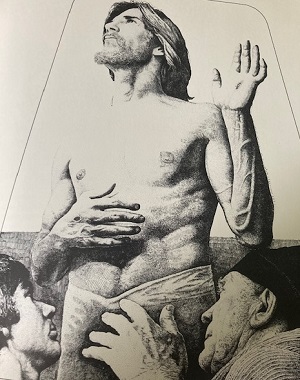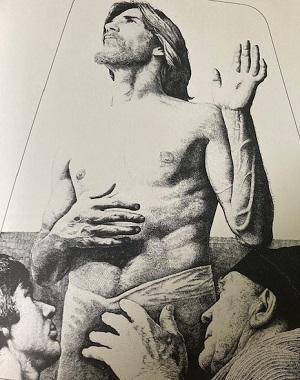

Ascension Sunday
Acts 1:1-11; Ps 47; Eph 1:17-23 or Heb 9:24-28; 10:19-23; Lk 24:46-53
“As Jesus blessed them, he parted from them and was taken up to heaven” (Luke 24:52).
The Ascension of Jesus is a theological event loaded with scriptural and cultural associations that give context and meaning to this key transition from his historical presence to his dynamic presence in the church.
For the evangelist, Jesus repeats and fulfills the dramatic departure of Elijah, who drops his cloak and a double portion of this spirit onto Elisha, his prophet apprentice. For Luke, writing for an increasingly Gentile audience in the Roman empire, Jesus’ Ascension also apes the reception of a conquering general returning to stand at the right hand of the emperor and distribute spoils to his army. A cosmic, triumphant Jesus stands at the throne of the Father and pours out charisms on his followers, the church.
One of the most striking fulfillment images for the Ascension was conveyed not by a theologian but by poet James Dickey and artist Marvin Hayes in their book, God’s Images (Oxmoor House, 1977). With text and drawing, they show Jesus lifting away from his disciples, the pulse in his veins visible as one of the disciples reaches out as though to hold him back by the ankle.
Very gently He touched my neck, and felt the blood throb there.
In that touch there was an infinite love, and no questions.
He looked toward blueness, across which a cloud was beginning.
I tried to hold Him in my arms, but somehow knew this was not
the time to restrain him.
He lifted away from me easily.
I held his warm, humanly pulsing ankle in my hand
As He went slowly upward. He entered the cloud.
He was gone from us, and never gone.
Never.
The biblical allusion is both clear and startling. Jesus is the firstborn Esau, seized by his younger twin, Jacob, at their birth. Jacob is revealing his destiny to take the blessing from his older brother. In the same way, the disciples are enlivened with the blood pulse of Jesus, who cedes his identity as he departs, for they are now his presence in the world by the power of his Holy Spirit.
At baptism we have all received the anointing, cloak, flame and Spirit of Jesus, the pulse and breath of his divine nature in the flesh and blood of our elder brother. His redemptive mission continues in time and space through us. In union with him and the Paschal Mystery of dying to ourselves to live his new life, we will also share his divinity. Sometimes called the best kept secret of Christianity, this promise of divine life is what is being transferred to us in Baptism, celebrated in the Ascension and at Pentecost.
If it seems too good to be true, we make it real by feeling the pulse in our neck and expanding chest with our next breath. God is that close —intimately closer-- because God called us from nothing and now sustains us in existence by love. By celebrating these important feasts together around the eucharistic table, we acknowledge the gift God is offering us.
Theology becomes art, then poetry, then life in us as we dare believe it and live it. What greater adventure is there? What other path can lead to such joy?
Advertisement




